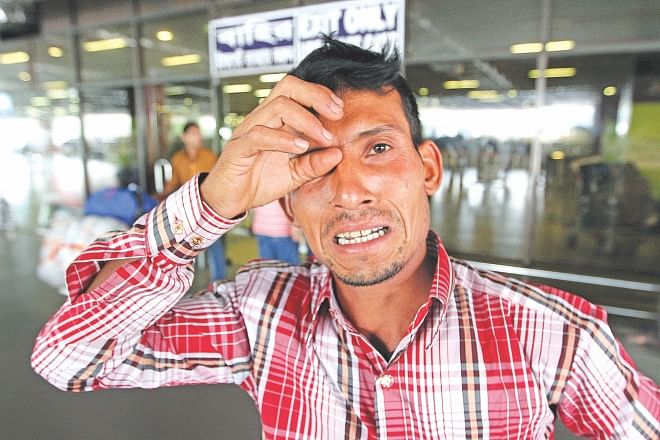Protecting migrant workers' rights: Rhetoric vs. reality
Protecting migrant workers' rights: Rhetoric vs. reality

This year marks the 24th anniversary of the adoption of the Convention on the Protection of the Rights of All Migrant Workers and Members of Their Families (ICMW). Though a long time has passed, only 47 states have ratified the Convention as of 2014. Around 200 million people in the world live in foreign countries as migrant workers. Because they are outside the legal protection of their home countries, migrants are often particularly vulnerable to abuse and exploitation.
THIS year marks the 24th anniversary of the adoption of the Convention on the Protection of the Rights of All Migrant Workers and Members of Their Families (ICMW). Though a long time has passed, only 47 states have ratified the Convention as of 2014. Around 200 million people in the world live in foreign countries as migrant workers. Because they are outside the legal protection of their home countries, migrants are often particularly vulnerable to abuse and exploitation.
In recognition of this, the United Nations drafted and adopted the ICMW on December 18, 1990. It emphasises the connection between migration and human rights, which has increasingly become a crucial policy topic worldwide. It is believed that its existence sets a moral standard, and serves as a guide and stimulus for the promotion of migrant rights in each country. This international initiative helps us perceive that the instrument has been successful in ensuring the rights of migrant workers around the world. But the sharp rise in deaths of Bangladeshi labour migrants due to maltreatment and hazardous working conditions in recent years compel us to rethink about the effectiveness of the Migrant Workers' Convention in promoting their rights.
It is argued that ratification of ICMW is obstructed by politics and by lack of political will. ICMW has not received support or ratification from major labour receiving countries, including European countries. So far, countries that have ratified the Convention are primarily countries of origin of migrants (such as Bangladesh, Sri Lanka, Morocco and the Philippines). For these countries, the Convention is an important instrument to protect their citizens living abroad. No migrant-receiving state in Western Europe or North America has ratified the Convention.
Other important receiving countries, such as Australia, Middle-Eastern states, India and South Africa have not ratified the Convention. As a result, the international community has failed to make migrants' rights a reality. Take the example of violation of migrants' rights in the Middle East. A recent survey suggests that more than half of Bangladeshi migrants face harassment while working abroad. These include wage problems, police pestering, and unacceptable treatment by employers on passport or visa related issues, and many other problems. For example, in Qatar, the much-criticised kafala system ties workers to their employers, meaning that employees are not paid and work in conditions of forced labour. The Qatari government's figure on the numbers of migrants points out that 964 migrant workers from Nepal, India and Bangladesh died in Qatar in 2012 and 2013. A report by the international law firm DLA Piper reveals that, in all, 246 died from “sudden cardiac deaths” in 2012, 35 died in falls and 28 committed suicide.
The provisions of the ICMW clarify that basic economic, social, and cultural rights apply to both regular and irregular migrant workers. It also provides a framework of state responsibility and accountability as to how to deal with and treat illegal migrants. However, the ICMW permits states to limit the rights of certain specific categories of temporary migrants, such as seasonal workers, project-tied workers, or specified-employment workers. In particular, feminisation of the migrant labour force and states' increasing reliance on temporary workers are not adequately reflected in the ICMW.
Unskilled workers often use private recruitment agents who compete intensely for the sale of their labour to employers in the destination country. Moreover, temporary migrant workers are vulnerable to abuse in the recruitment process. Such abuse includes deliberate misinformation about the working and living conditions in the country of employment, and the charging of excessive fees. Besides, the chronic reluctance of states to agree to legally binding, multilateral instruments that regulate international labour migration and protect the rights of migrant workers is a major obstacle in turning migrants' rights from paper to reality.
It is pertinent to say that the aforementioned issues, along with the fear of sending countries that ratification would result in a loss of labour markets in destination countries to their non-ratifying competitors, as well as ignorance of ratified countries to properly address the concerns of their migrant workers show that there is mismatch between rhetoric and reality. Migrant workers, the national heroes of developing countries, want to enjoy their rights and have a peaceful, prosperous and secure life. For that, universal ratification of the Migrant Workers' Convention and political will of both labour sending and receiving states is of utmost importance.
The writer is MSS student at the Department of International Relations, University of Dhaka.
E-mail: farhana.du63@gmail.com